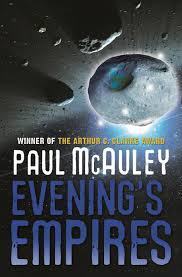June 2, 2014: Our Book of the Month Club reconvenes to discuss Evening’s Empire by Paul McAuley!
 “In the far future, a young man stands on a barren asteroid. His ship has been stolen, his family kidnapped or worse, and all he has on his side is a semi-intelligent spacesuit. The only member of the crew to escape, Hari has barely been off his ship before. It was his birthplace, his home and his future. He’s going to get it back. “
“In the far future, a young man stands on a barren asteroid. His ship has been stolen, his family kidnapped or worse, and all he has on his side is a semi-intelligent spacesuit. The only member of the crew to escape, Hari has barely been off his ship before. It was his birthplace, his home and his future. He’s going to get it back. “
It certainly sounds like a focused, revenge-fueled romp but, in reality, Evening’s Empires is actually a sweeping, cerebral tale of betrayal, vengeance, and, surprisingly, family. It’s an ambitious and intelligent novel that is both hard SF and space opera although, to be perfectly honest, it took a while for the story to really capture my interest. For the first fifty pages or so, I was utterly baffled, even frustrated, by the overwhelming denseness of the shifting social landscapes and political and religious paradigms.
The book is incredibly rich in its grand scope world galaxy-building and much of the background history, established and developed in the author’s previous books, can be incredibly confusing for the uninitiated. I had to double (and triple) check that Evening’s Empires was, in fact, a standalone novel that didn’t require any knowledge of McAuley’s other works. The various backstory elements are eventually explained, a little too often in the form of mass conversational info dumps but, once I finally had a better understanding of its foundations, the novel became a far more enjoyable read. Still, partway through, when I came across the line “It’s a maze he lost himself in.” I couldn’t help think “There but for the Grace of God went I”.
At the heart of this book is the mystery of “the bright moment”, a simultaneously shared vision, glimpsed by everyone in the solar system, of a man on a bicycle. Our hero, Hari, is raised on a spaceship where his family plays host to a scientist studying “the bright moment”. Then, one day, their ship is hijacked and Hari is forced to flee – with the scientist’s head and the valuable data it contains. Hari plots to retake his ship but, to do so, he must connect with people from his past and peel the onion on a multi-layered mystery involving religious fanatics, shifting alliances, and dangerous clones.
It all makes for a head-spinning tour-de-force that, I suspect, will leave many readers thoroughly amazed by the novel’s depth and breadth while, simultaneously, leaving just as many thoroughly bewildered.
As an added bonus for the well-read SF fan, the book is divided into six parts titled: Childhood’s End, Marooned Off Vespa, The Caves of Steel, Pirates of the Asteroids, The Cold Equations, and Downward to the Earth. I’m not sure if there was more to it than a simple tip of the hat to the golden age classics, but there’s no denying Evening’s Empire has far more in common with the narratively expansive and challenging works of Alastair Reynolds and Iain M. Banks than it does the works of Clarke, Asimov, and Silverberg.
Let’s get the conversation started. What did you all think of Evening’s Empires?
Joseph Mallozzi's Blog
- Joseph Mallozzi's profile
- 39 followers





